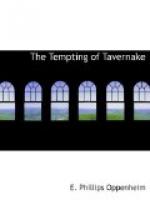“Is the speculation going all right?” she asked.
“I am hoping to get the money together this week,” he replied. “If I get it, I shall be well off in a year, rich in five years.”
“There is just a doubt about your getting it, then?” she inquired.
“Just a doubt,” he admitted. “I have a solicitor who is doing his best to raise a loan, but I have not heard from him for two days. Then I have also a friend who has promised it to me, a friend upon whom I am not quite sure if I can rely.”
They turned into the Strand.
“Tell me about my father, Leonard,” she begged.
He hesitated; it was hard to know exactly how to speak of the professor.
“Perhaps if you have talked with him at all,” she went on, “it will help you to understand one of the difficulties I had to face in life.”
“He is, I should imagine, a little weak,” Tavernake suggested, hesitatingly.
“Very,” she answered. “My mother left him in my charge, but I cannot keep him.”
“Your sister—” he began.
She nodded.
“My sister has more influence than I. She makes life easier for him.”
They reached the restaurant and made their way upstairs. Tavernake appropriated the same table and once more the head waiter protested.
“If the gentleman comes again to-night,” Tavernake said, “you will find that he will be only too glad to have supper with us.”
Then the professor came. He made his usual somewhat theatrical entrance, carrying his broad-brimmed hat in his hand, brandishing his silver-topped cane. When he saw Tavernake and Beatrice, he stopped short. Then he held out both hands, which Beatrice immediately seized. There were tears in his eyes, tears running down his cheeks. He sat down heavily in the chair which Tavernake was holding for him.
“Beatrice,” he exclaimed, “why, this is most affecting! You have come here to have supper with your old father. You trust me, then?”
“Absolutely,” she replied, still clasping his hands. “If you give me away to Elizabeth, it will be the end. The next time I shall never be found.”
“For some days,” he assured her, “I have known exactly where you were to be found. I have never spoken of it. You are safe. My meals up here,” he added, with a little sigh, “have been sad feasts. To-night we will be cheerful. Some quails, I think, quails and some Clicquot for you, my dear. You need it. Ah, this is a happiness indeed!”
“You know Mr. Tavernake, father,” she remarked, after he had given a somewhat lengthy order to the waiter.
“I met and talked with Mr. Tavernake here the other night,” the professor admitted, with condescension.
“Mr. Tavernake was very good to me at a time when I needed help,” Beatrice told him.
The professor grasped Tavernake’s hands.
“You were good to my child,” he said, “you were good to me. Waiter, three cocktails immediately,” he ordered, turning round. “I must drink your health, Mr. Tavernake—I must drink your health at once.”




